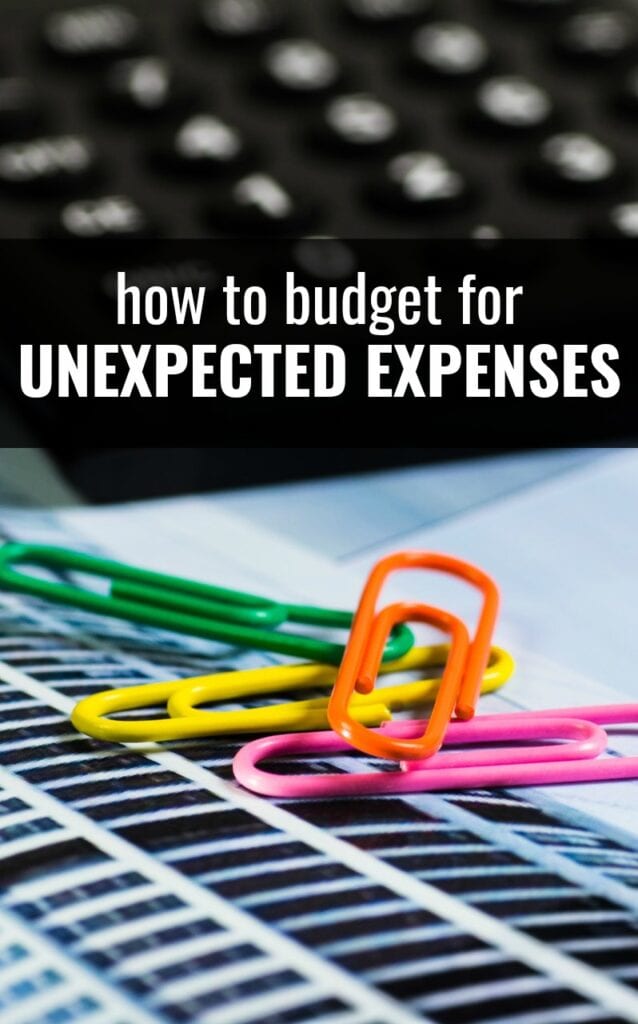 Unexpected expenses are about as constant as the days of the week – they occur often and are expected. The only problem is that you never know when certain expenses will pop up nor how much you’ll have to pay.
Unexpected expenses are about as constant as the days of the week – they occur often and are expected. The only problem is that you never know when certain expenses will pop up nor how much you’ll have to pay.
This makes it very hard to budget for unexpected expenses so you can prepare your finances.
When you’re not prepared to pay for an unexpected or emergency expense, it can make you feel really stressed and willing to resort to getting into debt by using a credit card or taking out a loan.
Even though it’s more difficult to prepare for unexpected expenses, it’s not impossible. Here are 4 simple ways to budget for unexpected expenses so you or your finances won’t be blindsided when they pop up.
1. Build Up Your Emergency Fund
Having an emergency fund is crucial to your financial success. Without one, you won’t be able to pay for emergency expenses that could affect your safety, health, and wellbeing.
No one plans to get sick or have their car break down in the middle of the road. But these things do happen and by having a solid emergency fund, you can prepare for these circumstances ahead of time so they won’t be a huge hit on your finances.
Regarding how much you should actually save in an emergency fund, the choice is up to you. Some experts recommend setting aside 3-6 months of expenses while others recommend saving 12 months of expenses.
It really depends on your needs and current situation. If you’re in a two-income household and you both have stable jobs and few liabilities, you may be able to get by with saving less. If you have kids or pets, you’ll probably need to save more.
I like keeping several smaller emergency fund savings accounts that I dedicate to specific categories like health expenses, car expenses, our cat, etc. I use Capital One 360 to house my emergency funds because it’s a great online bank that lets you open several savings and checking accounts for free.
2. Create a Slush Fund
After you’ve taken the time to build your emergency fund, you’ll realize that it can become difficult to part with the money. While it should only be reserved for true emergencies, you may have other small expenses that pop up from time to time and a slush fund can help you cover those.
A slush fund is similar to an emergency fund being that is can be used to pay for unexpected expenses. However, you can keep slush fund money right in your checking account and it’s great for smaller, non-emergency expenses along with keeping your checking account out of the negative.
Let’s say one of your child lets you know there’s a field trip coming up that you have to pay for. Or, maybe you realize you have to attend a potluck and spend $30 on groceries since you need to buy food to prepare your dish.
These types of expenses aren’t dire, but they can be unexpected and having a small slush fund sitting in your checking account can help you handle the extra expenses with ease. Depending on how much you spend each month, having a slush fund ranging from $500 – $1,000 should be plenty and a solid line of defense before you’d need to use your emergency fund.

3. Save Regularly For Annual and Bi-Annual Expenses
Some ‘unexpected expenses’ may not be unexpected at all. If you have annual or bi-annual expenses like your car insurance, for example, you’ll often know about those expenses ahead of time.
If you don’t save up and prepare in advance when your annual bills are due, they will seem like an unexpected expense and your finances will take a big hit.
To avoid that, consider setting aside small amounts of money each month to cover expenses that aren’t monthly.
For example, if you own a car in Illinois, every year you have to pay a registration fee of $100. It’s basically for a sticker to put on your license plate with the updated year. I call it the world’s most expensive sticker because without it, you can get a ticket for driving.
Mine is always due in April and instead of freaking out when the bill arrives in the mail, I set aside $8.30 over 12 months so I can have the money ready to go without any issues.
4. Don’t Budget Down to $0 Each Month
Another option is to factor unexpected expenses into your monthly budget. You can do this by avoiding a zero-sum budget. If you’ve never heard of a zero-sum budget, it’s when you include every dollar you earn into your budget for the month.
That means no money is leftover because you give every dollar a specific purpose. I think it’s a very efficient way to budget and ensure you’re not overspending or wasting any of your money, but I don’t believe it works for everyone.
Since my income fluctuates, it’s hard for me to use a zero-sum budget each month unless I live on my previous month’s income so I’ll already know what I have to spend for the month (ie. the money I earn in September will be spent in October).
However, I actually like to avoid zero-sum budgeting and purposely leave some extra money in my budget to cover any unexpected expenses. Lately, it seems like they’ve been popping up often between random medical bills, programs for my son, etc.
It feels good to actually have a budget category set aside for unexpected expenses. If there are no unexpected expenses for the month and the money doesn’t get spent, I simply add it to my debt payments or savings accounts.
I will note that to use this method, you must have some discipline because you don’t want to leave extra wiggle room in your budget to make impulse purchases instead.
When it comes to being able to handle unexpected expenses, you don’t have to lose hope. Instead, prepare yourself and your budget by using a combination of these 4 methods. You’ll have much more peace of mind and control over your situation and choices.
How do you handle unexpected expenses and do you find it difficult to budget for them ahead of time?


